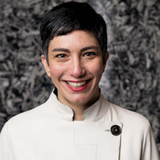In the new and final Designing Cities For All: RE-generation series City Games in the Age of Urban AI DCFA fellow Ekim Tan, director of Games For Cities and founder of Play The City, explores the role of city games in the era of artificial intelligence. This series aims to advance research by design, highlighting the need for engagement to achieve real impact. With Urban AI entering city practices, the series will examine how city games can enhance democratic practices and inspire spatial design within increasingly digitised communities. It seeks to explore the future of urban living, using the power of city games and AI to create more inclusive, connected, and future-proof cities.
The first episode of City Games in the Age of Urban AI series, Digitalisation, with DCFA Fellow Ekim Tan, delves into the dynamic intersection of digitalisation, artificial intelligence, and urban games. We will explore how AI is transforming urban environments and the possible effects of AI on digitised and non-digitised communities. What is the role of City Games and AI in representing the various systems and assets of the city?

About the DCFA Fellow
Ekim Tan is an architect from Istanbul based in Amsterdam. She obtained her doctoral degree at the Delft University of Technology with a focus on ‘ City gaming ‘, a method that refers to the specific implementation of serious games to city development questions. Later she published her book, Play the City: Games Informing Urban Development (2017) to provide a deeper understanding of our values, experiences, and intellectual attitude. In 2010, she founded Play the City , an Amsterdam and Istanbul-based city gaming practice that helps governments and market parties effectively collaborate with stakeholders. In 2016, Ekim co-founded Games for Cities , an umbrella organization of game[like] practices worldwide. Play the City leads the way in applying games to complex, multiplayer city challenges.
About the speakers
Carissa Champlin is an assistant professor in geo-transdisciplinarity at ITC-University of Twente. Following her training as an urban planner, she completed her doctoral degree on the topic of gamified co-design methods for multi-actor planning and decision support in German and Dutch cities. Working within joint initiatives like the 4TU. Center for Resilience Engineering , Carissa advances approaches and digital technologies that cross disciplinary lines and societal boundaries through the application of design thinking and serious gaming. Her work aims to collectively plan and assess disaster responses in highly populated areas and envision urban futures that are just, resilient, and liveable for all. While at the Delft University of Technology, she began collaborating with artists and industrial designers to develop new approaches for the smart and social city like the CCmCC Festival in 2023. Carissa also serves on the Games for Cities board as an advisor on research strategy and city gaming developments and future directions.
Mert Akay is a PhD Researcher at the Faculty of Industrial Design Engineering, TU Delft. With a background in urban planning and design, he has practical and academic experience touching different aspects, mediums, and scales of research and practice. He has also been involved in several research projects and planning practices at the local and national levels. His research agenda focuses on urban analytics, urban climate, urban morphology and data-driven urbanism. In his PhD research, he explores new methodological and practical approaches to bridge big data and thick data to further understand climate-related challenges and develop relevant solutions.
Mikala Hyldig Dal is an artist and curator working with new media and performance. She explores political cultures through emerging technologies and collective interventions. Her work integrates critical theory into immersive digital environments, challenging dominant power structures from intersectional perspectives. Her practice involves augmented reality, virtual reality, and artificial intelligence. She approaches virtual space as a potential to contest, undo, and rethink historical markers set in stone; collective memory becomes a fluid, ephemeral, and critically discursive space. Fusing elements from speculative history, science (fiction), and mythology, her work has been exhibited internationally, including at the 12th Berlin Biennial, and many more. In 2018, she co-founded the queer-feminist artist collective Maternal Fantasies, discussing the politics of care-work and representation of Motherhood(s) in and beyond the arts. In 2022, together with programmer Farhan Khalid, she created the augmented reality app “Monuments AR” for site-specific interventions in digital space, focusing on decolonial interventions. In 2019 she initiated the event series Open/Occupy Flutgraben to develop artistic strategies against the ongoing gentrification of Berlin.
About Designing Cities for All: RE generation
Over the first two years of Designing Cities for All (DCFA), we’ve learned about exclusion by design and the (re)design of inclusive cities. Along the journey, a certain question kept popping up: what exactly does ‘for all’ entail? After focusing mostly on the ‘who’ over the past two years, DCFA is rebooting as Designing Cities for All: RE-generation . This way around, the series is also incorporating the ‘what’ by looking through the fresh lens of regenerative design. This emerging field might very well be a promising answer to the challenges of our time, as it focuses on the design of products, services, systems, and processes that lead to both social and ecological recovery and that keep the systems healthy.






